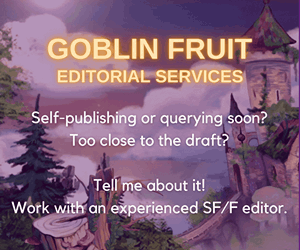When they take the god out of you, you wonder at first if you’ve been killed, but it wasn’t very well done, and you wish someone would hurry up and finish the job. You were strapped down and touched with fire from shoulder to hip, and when they let you go again, still quietly screaming, you see the divinity that so recently lived just beneath your sixth rib.
A small wrinkly thing. Galaxies spin through the eyes that stare out, through the star-jar where it has been contained, at the figures ranged around the operating room: you, two masked surgeons, present only for propriety, and then the ones who really matter—the beings in their shifting white cloaks, with blood and sick on their hands. You had not known, before today, that such entities existed, who had power enough to wrestle the gods free from their human hosts and place them in the sky.
The beings do not stay, of course, to explain the finer details of their natures; star-jar in hand, they shimmer away on their celestial business. The doctors detach themselves from the periphery, wielding needle and thread. A chaplain arrives to stitch up your soul in like manner with some tracts and a directory of temples welcoming votaries. You’ll need a holy place, he says, to keep you busy until the god you birthed grows strong enough to be worshipped.
You visit the altars and pay your tokens at more chapel doors than you can count, but it isn’t the deities you focus on as you kneel or wobble on one leg or lie flat on your back, as required. You’re thinking about the other people with god-shaped holes beneath their lungs, all moving around this city: waking up, and going to the office, and feeding babies, and folding laundry, still pretending to have remained themselves. How did they learn to fill this emptiness—how do they salve this ache for something so profound it seems impossible to live without?
Lack calls to lack, so it isn’t hard to find the others. In dim city corners, they spend the hours filling themselves up from the outside-in, and you join their neon-lit parties at the Moonwalk, taking cheap stardust and cheaper moonshine. When they touch your fragile shell, you reach for them in return, hoping another body might fit in the space. But it all goes into and through you, unable to catch hold on the edge of your longing.
A haze of nights later, feeling emptier than when you began, you decide your only other option is to try from the inside-out. You decide to grow another god.
• • • •
You remember the first time you realized you were a host: twelve years old, and the boy on the playground grabbed your arm, twisting hard because you were a girl, because you were smaller than him, because he could. When you cried out, you felt something twist inside your chest in the opposite direction, unraveling backward, until the boy was the one screaming, staring at the shattered joint of his elbow. He called you a monster. That wasn’t the last thing that people said you were.
The priests told you this was a gift, that you were rare, wondrous. Your earth-mother began to treat you like an exotic animal, valuable but dangerous with long teeth. Your earth-siblings, mindful of your ability to break bones, expressed their fear and hatred through mud in your sandwiches and unicorn beetles under your pillow and anonymous messages on your phone saying you should have been sent off-world in a three-day capsule or drowned at birth. Teachers and minders gave you a wide berth, used to volatile outbursts from others like you whom, you were assured in your despair, did exist; but the more considerate ones—the ones who dealt detention over the beetles and hate mail—said they looked forward to the god. They hoped it might be strong enough to save the world.
The world was still ending in your time, though the previous scientific attempts to cope with it had been abandoned in favor of religious revival. Even though the newspapers predicted this trend would fall out of fashion as quickly as every other effort, the houses of worship were kept in better condition than the houses of pleasure, and temples had fresher flowers than graves. And there were always new gods. The question was where to start.
You were never sure if it was the three rounds of preventative shots from when you were six and puking up your guts from one of the variants that made the difference, but chemical manipulation was your only lead. Your new hollow friends knew of ways to get drugs and plied you with needles and pills. When you asked them what to take and in what order, they just shrugged. “It’s your god,” they said. “Do it the way you think you have to.”
So you play roulette and lie sweating in bed with a bitter taste under your tongue, as spiders crawl up your skin and the bird in the cuckoo clock flies out to beat you with its wings. You wonder what would happen if you died. Will your first god come to take you? Or did the beings not assign it an afterlife, leaving you to a timeless nothing? Even if it did get a heaven, would that place be any different from the kitchen of your home in late April when you were nine years old, the sun splashing across the cracked plasterwork? Your earth-mother hung dried flowers from the rafters so that the scent clung to your hair for days afterward like the ghost of a world that had once been happy. You begin to suspect you carried that crevasse of longing for much longer than since the moment after your theophany.
Neighbors come in to check on you and your apparently unprecedented experiment. “You might as well stop this now,” one advises. “Even if you don’t kill yourself, the beings won’t let you keep an unauthorized god. You’ll be mined again and punished, don’t you know that?”
You see yourself on the operating table, cracked open like an egg and scraped clean, so there could be no chance of a repeat performance.
Another takes notes on the changes in your condition and the diverse combination of substances taken to provoke them. “If this works, we can patent it,” he crows. “The beings all want more gods; we’ll be rich!”
Someone gets worried about the state of your soul and thus the souls of everyone else in the building, so she summons a priest to deal with it. They think you’re a fool. “How many faces do you possess?” they demand. “Your first god was made in your image, and no two gods are alike. That’s science, not religion. You have no idea how you need to change in order to have another, and even then it’s likely to get branded a heresy, nothing but a stunted off-shoot.”
The ceiling has turned purple and chartreuse, and you have no answer to give.
• • • •
Around the time that you run out of drugs, you learn that your first god has finally received its own temple. The headline blares from the top of the screen, declaring it the hottest divine debut of the year. The news makes you faintly wistful, to have accomplished anything so important.
The building sits a little off the highway, a low cinderblock hall painted the color of amnion. You go to visit before the official opening, but state-issued donation boxes already stand guard at either side of the door. Their stiff white shapes remind you of the beings, and you dislike having to push in your coins. Chu-chunk-chunk, says the machines, and the door glides open.
It’s cold inside, and the magnetic energy from the worship instructions sign raises an electric prickle on your skin. The information is written in ninety-three of the most commonly recognized languages, yet you understand nothing of such fatuous posturing. You cannot imagine ever being satisfied by anyone making these rote, ritual motions. The sign disperses, and you walk through the cavernous space toward the altar.
A metal-top table stands against the back wall, under a niche set into the whitewashed plaster. The borders of the space had been inexpertly leveled, and the slanted sides cast bizarre shadows from the harsh lights twenty feet up. Your heart plummets. Here, maybe, after all this time, you might have been able to see your god again, but perhaps that was too ambitious a hope. That would be too easy. This god hasn’t been yours for a long time. Besides, it doesn’t appear to be at home just now, so you climb up onto the table and let the chilly metal sink its teeth into your bones, to wait.
You think back to the last time you lay on a surface this level and sacrificial. But now, you remember it differently. Now, you see the doctors and the beings alike shaking their heads over the red wound they made down your sternum that gapes like a soundless mouth. Someone got it wrong, they said. There never was anything inside you. They patched you up and sent you home, an ordinary liar who wanted the fame of hosting a god. But, lacking a reason for this unutterable imbalance of selfhood, you continued telling yourself the story that had been your own for more than half your life: Ima Day birthed a god, made in her image. It only knows how to tell one story. But perhaps a story told over and over gains its own shape, hardened by belief until it becomes real, even if it could never be true. You and your god have the same face. Perhaps you had gotten it backward.
You kneel up before the empty niche. It had been cut wide and deep, big enough for a body of your size. There’s a gap between the altar and the wall, and you pitch forward, dropping down into the shadows. It’s a much longer way down than you expected, but it doesn’t frighten you. Instead, you feel relief that the emptiness has gotten outside of you, at last. The darkness wraps itself around your ribs with the smell of wildflowers, and you are nine years old again in the sunshine, and you are finally whole.
Enjoyed this story? Consider supporting us via one of the following methods:










